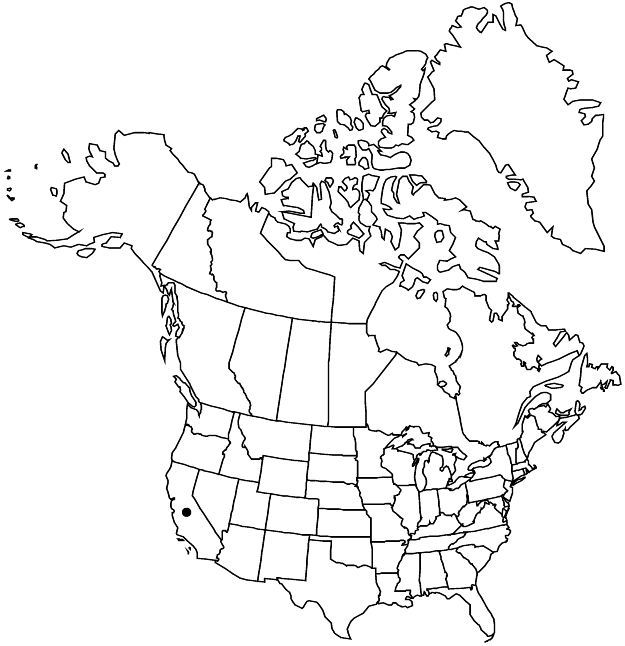Difference between revisions of "Eriogonum thornei"
Harvard Pap. Bot. 3: 51. 1998.
FNA>Volume Importer |
FNA>Volume Importer |
||
| Line 30: | Line 30: | ||
|elevation=1800 m | |elevation=1800 m | ||
|distribution=Calif. | |distribution=Calif. | ||
| − | |discussion=<p>Eriogonum thornei is known from a single canyon area in the New York Mountains, San Bernardino County. Shultz elevated Thorne’s wild buckwheat to species status when she proposed E. phoeniceum, here considered a variety of E. microthecum. Eriogonum thornei and E. ericifolium are weakly differentiated, with minimal morphologic differences, and yet they occur on different substrates and are well-removed biogeographically from each other. Thorne’s wild buckwheat is a protected plant in California.</p> | + | |discussion=<p><i>Eriogonum thornei</i> is known from a single canyon area in the New York Mountains, San Bernardino County. Shultz elevated Thorne’s wild buckwheat to species status when she proposed E. phoeniceum, here considered a variety of <i>E. microthecum</i>. <i>Eriogonum thornei</i> and <i>E. ericifolium</i> are weakly differentiated, with minimal morphologic differences, and yet they occur on different substrates and are well-removed biogeographically from each other. Thorne’s wild buckwheat is a protected plant in California.</p> |
|tables= | |tables= | ||
|references= | |references= | ||
| Line 54: | Line 54: | ||
|publication year=1998 | |publication year=1998 | ||
|special status= | |special status= | ||
| − | |source xml=https://jpend@bitbucket.org/aafc-mbb/fna-data-curation.git/src/ | + | |source xml=https://jpend@bitbucket.org/aafc-mbb/fna-data-curation.git/src/8f726806613d60c220dc4493de13607dd3150896/coarse_grained_fna_xml/V5/V5_476.xml |
|subfamily=Polygonaceae subfam. Eriogonoideae | |subfamily=Polygonaceae subfam. Eriogonoideae | ||
|genus=Eriogonum | |genus=Eriogonum | ||
Revision as of 17:39, 18 September 2019
Subshrubs, spreading and matted, not scapose, 0.4–0.8 × 0.4–1(–2.5) dm. Stems spreading, with persistent leaf bases, up to 1/4 height of plant; caudex stems compact; aerial flowering stems spreading, slender, solid, not fistulose, 0.1–0.2 dm, floccose to slightly tomentose. Leaves cauline, 1 per node or fasciculate; petiole 0.01–0.02 cm, tomentose; blade linear, 0.4–0.6 × 0.05–0.1 cm, densely white-tomentose adaxially, finely villous and green adaxially, margins revolute. Inflorescences umbellate-cymose, compact, 0.5–1 × 0.5–1 cm; branches usually dichotomous, otherwise with secondaries suppressed, glabrous or nearly so; bracts 3, scalelike, linear, 0.5–1 mm. Peduncles absent. Involucres 1 per node, turbinate, 1.5–2 × 1–1.5 mm, floccose; teeth 5, erect, 0.4–0.6 mm. Flowers 1.5–2 mm; perianth white, glabrous; tepals connate proximal 1/4, dimorphic, those of outer whorl obovate, 1–1.5 mm wide, those of inner whorl oblanceolate, 0.8–1 mm wide, connate proximally; stamens slightly exserted, 2–3 mm; filaments pilose proximally. Achenes light brown, 2–2.5 mm, glabrous except for papillate beak.
Phenology: Flowering May–Jul.
Habitat: Copper-rich quartzite gravel on ridges, pinyon woodlands
Elevation: 1800 m
Discussion
Eriogonum thornei is known from a single canyon area in the New York Mountains, San Bernardino County. Shultz elevated Thorne’s wild buckwheat to species status when she proposed E. phoeniceum, here considered a variety of E. microthecum. Eriogonum thornei and E. ericifolium are weakly differentiated, with minimal morphologic differences, and yet they occur on different substrates and are well-removed biogeographically from each other. Thorne’s wild buckwheat is a protected plant in California.
Selected References
None.
